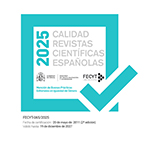Las relaciones entre Costa Rica y España: de la tensión en la ONU a la normalización del vínculo diplomático (1946-1953)
Resumen
Tras la reapertura del caso de la controvertida Spanish question, aquel mayo de 1949 fue un mes especialmente intenso para los delegados de las Naciones Unidas. A propuesta de cuatro países latinoamericanos, se pusieron en cuestionamiento las resoluciones condenatorias que pesaban sobre el gobierno del general Franco desde diciembre de 1946. En esta coyuntura, que dejó entrever las grandes diferencias de criterio entre los países miembros, la posición de Costa Rica estuvo envuelta en una fuerte polémica, ante la indisciplina de sus delegados en la ONU y las grandes fracturas existentes en el seno de la Junta de Gobierno, así como entre ésta y el nuevo presidente electo Otilio Ulate (1949-1953). Sin embargo, la nueva presidencia fue determinante para la normalización plena de las relaciones entre Costa Rica y España, que culminó con la firma de un tratado de amistad perpetua en 1953.Descargas
Descarga artículo
Licencia
La Revista Complutense de Historia de América, para fomentar el intercambio global del conocimiento, facilita el acceso sin restricciones a sus contenidos desde el momento de su publicación en la presente edición electrónica, y por eso es una revista de acceso abierto. Los originales publicados en esta revista son propiedad de la Universidad Complutense de Madrid y es obligatorio citar su procedencia en cualquier reproducción total o parcial. Todos los contenidos se distribuyen bajo una licencia de uso y distribución Creative Commons Reconocimiento 4.0 (CC BY 4.0). Esta circunstancia ha de hacerse constar expresamente de esta forma cuando sea necesario. Puede consultar la versión informativa y el texto legal de la licencia.











